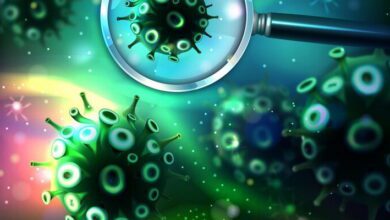Host-Pathogen Interactions MCQs with Answers

Welcome to the Host-Pathogen Interactions MCQs with Answers. In this post, we have shared Host-Pathogen Interactions Online Test for different competitive exams. Find practice Host-Pathogen Interactions Practice Questions with answers in Biology Tests exams here. Each question offers a chance to enhance your knowledge regarding Host-Pathogen Interactions.
| This complex and dynamic interaction plays the most prominent role in determining infections with multiple possible outcomes. These engagements between the immune system of the host and invading pathogens present some form of a battlefield where battles are continuously put forth by bacteria, viruses, fungi, and parasites. All this interaction is important to determine how to treat and prevent infectious disease. The host has many mechanisms of defense, which can identify and eliminate pathogens. Innate immunity is the very first point of defense through anatomical barriers like the skin and mucous membranes, as well as immune cells that can presumably identify and destroy the invading agents. When these barriers are broken, appropriate response follows through adaptive immunity in the form of antibodies and specialized cells that would eventually remove the threat. They have developed several mechanisms to avoid the immune system of the host. For instance, they can modify surface protein expression to avoid immune surveillance or cause damage to the tissues of the host through the use of toxins and manipulate immunity-involved signaling pathways. These pathogens, such as HIV and malaria, have developed highly sophisticated mechanisms for survival within the host that leads to chronic infections. Important strides made in the host-pathogen interaction research that have given great improvement towards medicine include devising vaccines, antibiotics, and antiviral therapies. Other than that, insight into emerging infectious diseases and the mechanisms by which antimicrobial resistances arise can be found. |
Host-Pathogen Interactions Online Quiz
By presenting 3 options to choose from, Host-Pathogen Interactions Quiz which cover a wide range of topics and levels of difficulty, making them adaptable to various learning objectives and preferences. You will have to read all the given answers of Host-Pathogen Interactions Questions and Answers and click over the correct answer.
- Test Name: Host-Pathogen Interactions MCQ Quiz Practice
- Type: Quiz Test
- Total Questions: 40
- Total Marks: 40
- Time: 40 minutes
Note: Answer of the questions will change randomly each time you start the test. Practice each quiz test at least 3 times if you want to secure High Marks. Once you are finished, click the View Results button. If any answer looks wrong to you in Quizzes. simply click on question and comment below that question. so that we can update the answer in the quiz section.
Download Certificate of Quiz Host-Pathogen Interactions
On the end of Quiz, you can download the certificate of the quiz if you got more than 70% marks. Add a certificate to your job application or social profile (like LinkedIn) and get more job offers.
If you are interested to enhance your knowledge regarding English, Physics, Chemistry, and Computer please click on the link of each category, you will be redirected to dedicated website for each category.




